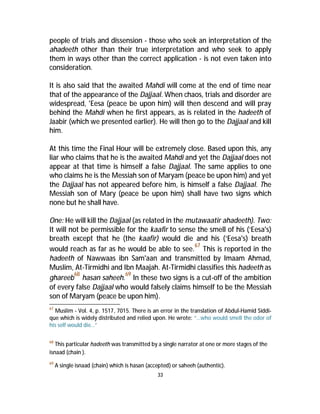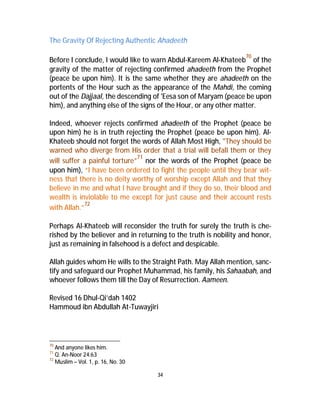The document is a treatise by Shaykh Hammoud ibn Abdullah at-Tuwayjiri, focused on affirming the beliefs regarding the coming of the Mahdi, the emergence of the Dajjal, and the descent of Jesus at the end of times, in response to modern skepticism. It addresses various arguments against these phenomena, emphasizing the importance of belief in authentic Hadith and their foundation in the Qur'an. The work also includes the author's biography and reflects his dedication to Islamic scholarship and defense of traditional beliefs.
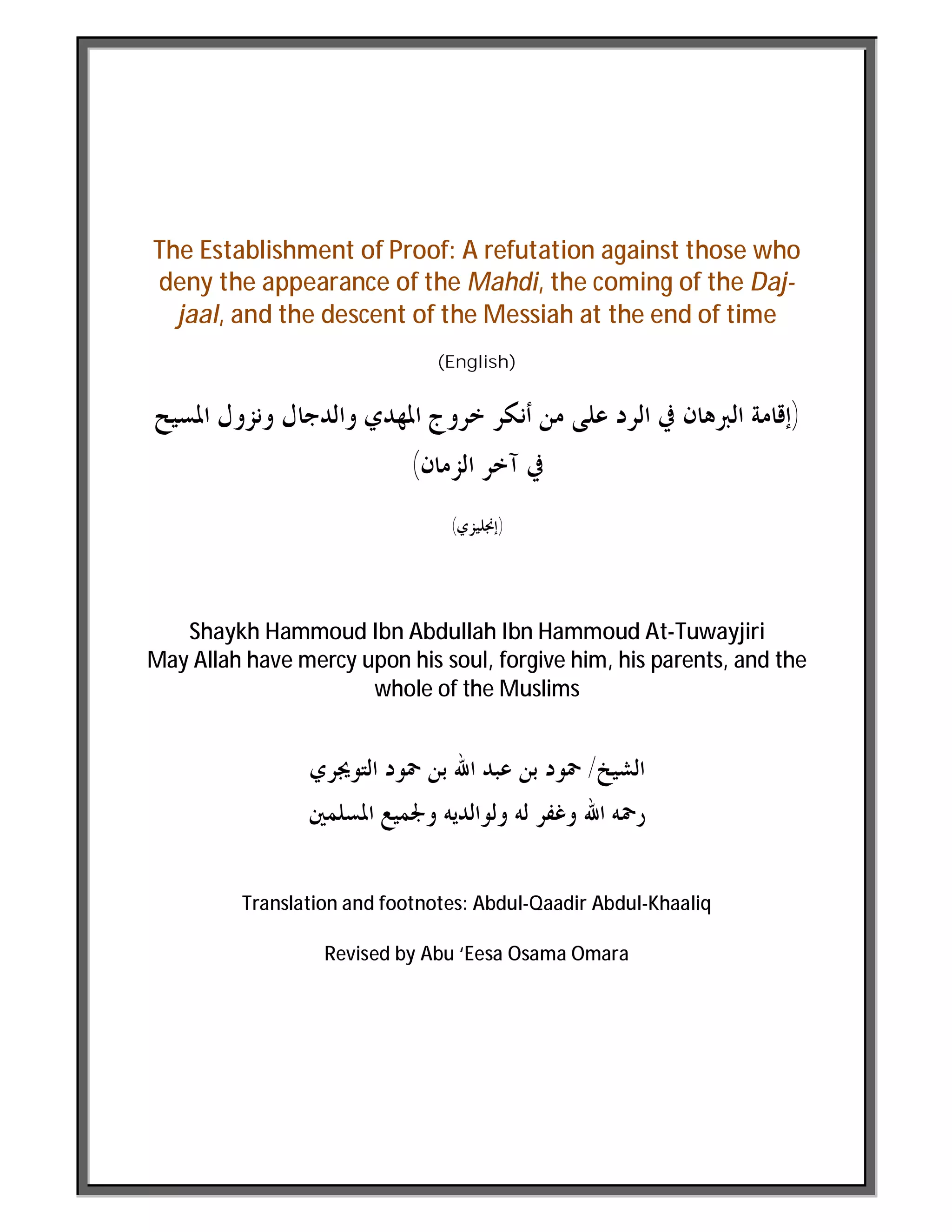
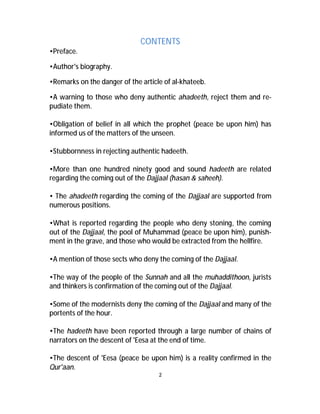
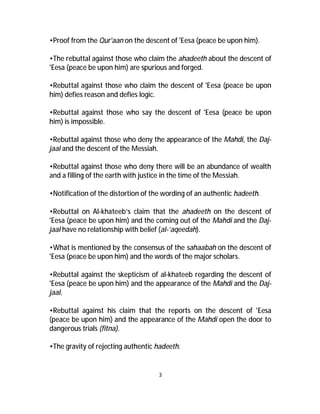
![With the name of Allah the merciful, the bestower of mercy
4
Preface
Verily all praise and thanks is due to Allah, we thank and praise Him and
we seek His aid and depend upon Him and we ask Him for forgiveness
and seek refuge in Him from the evils of ourselves and the wickedness of
our deeds. Whoever Allah guides there is no one who can lead him astray,
and whoever Allah leads astray there is none who can guide him. I testify
that there is nothing deserving of worship in truth except Allah Who is
alone and without any partner and I bear witness that Muhammad is the
slave servant and final Prophet and Messenger of Allah. Verily the most
truthful and correct speech is the Book of Allah and best of guidance is
the guidance of Muhammad (peace be upon him). The worst of all mat-ters
in religion are those newly invented matters and each invented mat-ter
is a forbidden innovation and every forbidden innovation is a straying
and every straying is in the fire.
The following is a brief treatise written by the late scholar Hammoud Ibn
Hammoud At-Tuwayjiri (May Allah have mercy upon his soul). Shaykh At-
Tuwayjiri was known as a staunch defender of Allah's religion, no matter
where the challenge stemmed from. He had perhaps written more books
in refutation of those who would attack or distort Islam than any other
major scholar from among his contemporaries and he was also known for
his piety and strength of argument. A brief biography of his life is offered
as a part of this translation that will, Insha’a Allah, give the reader a
glimpse of this great scholar's life.
I have attempted to render this important treatise into the English lan-guage
in hopes that it will provide conclusive answers to many questions
regarding these particular phenomena of the Last Days. There exists
widespread ignorance among the Muslims of the East and the West
about Prophet 'Eesa's [Jesus Christ] (peace be upon him) return and the
coming of the Mahdi and the Dajjaal despite it being among the obligato-ry
beliefs for every Muslim. Shaykh At-Tuwayjiri has carefully answered
some common questions and doubts raised regarding this issue as part of
a response to an article written in an issue of Al-Muslimoon magazine.](https://image.slidesharecdn.com/entheestablishmentofproof-141015052601-conversion-gate01/85/En-the-establishment_of_proof-4-320.jpg)
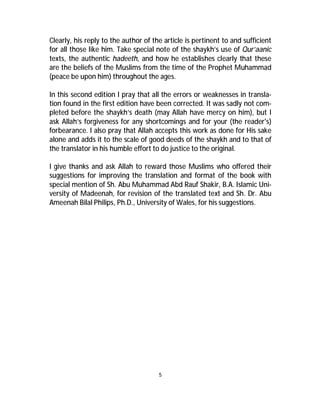
![A Brief Biography Of Al-Allaamah Ash-Shaykh Hammoud Ibn Abdullah
At-Tuwayjiri
(May Allah Have Mercy Upon His Soul)
B. 1334 A.H. (1916 A.D.)- D. 1413 A.H. (1992 A.D.)1
[Adapted from a eulogy by Abdul-Kareem Ibn Hammoud At-Tuwayjiri]
The shaykh's full name was Abu Abdullah Hammoud Ibn Abdullah Ibn
Hammoud Ibn Abdur-Rahmaan At-Tuwayjiri from the tribe of Bakr Ibn
Wael Batn from Rabee'ah in Saudi Arabia. He was born in the city of Al-
Majma'ah on Friday 15 of Dhul-Hijjah 1334 A.H. (October 15, 1916 A.D.)
and his father died in the year 1342 A.H. (1924 A.D.) when he was eight
years old.
As a boy, Hammoud At-Tuwayjiri began reading at the hand of Shaykh
Ahmed As-Saani' in the year 1342 A.H., just days before the death of his
father. He learned, at the shaykh's hand, the fundamentals of reading and
writing and he memorized the Qur'aan at the age of eleven. He also
learned from the book “Al-Usool Ath-Thalaathah” by Shaykh Muhammad
Ibn Abdul-Wahaab (may Allah have mercy upon his soul). He began learn-ing
the book “Al-Fiqh Al-Akbar” with Shaykh Abdullah Ibn Abdul-Aziz Al-
'Anawi the Judge of Al-Majma'ah and had mastered it at the age of 13. He
learned many sciences and arts by his thirties; Tafseer, Hadeeth, Taw-heed,
Fiqh, Language, History, Literature and others. He had committed
to memory a number of Islamic texts. He earned an Ijaaza2 in narrating
the saheeh books, and the sunan and the masaneed as well as relating
the books of Shaykhul-Islam Ibn Taymiyyah and his student Allaama Ibn
Al-Qayyim, and in teaching the Hanbali madhab as well as all of the books
of authentic narrations (marwiyaat li-kutub al-athbaat). Additionally, he
studied at the hand of the jurist Al-Allaamah Muhammad Ibn Abdul-
Muhsin Al-Khayaal, the Judge of Madeenah in grammar and Al-Faraa’id.3
6
1 All date conversions are approximate.
2 Permission of the teaching scholar, license, or degree attained after reaching a high level
of proficiency within that subject.
3 Laws of Inheritance](https://image.slidesharecdn.com/entheestablishmentofproof-141015052601-conversion-gate01/85/En-the-establishment_of_proof-6-320.jpg)
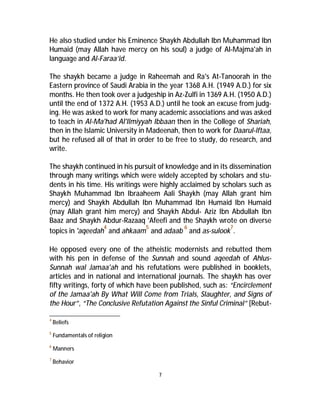
![tal of those who attack Saheeh Al-Bukhaari], “Severe and Sharp Finish To
Those Who Would Oppose The Kitaab, the Sunnah, the Consensus and the
Traditions” [Rebuttal to those who have permitted interest [ribaa] in the
banks], “Affirmation of Allah Being High Above His Creation”, “A Heated
Word on Ordering the Good and Forbidding Evil”, “The Belief of the People
of Faith Regarding the Creation of Adam upon the Image of Ar-Rahmaan”,
“Clarification And Explanation Of Those Matters Which Many Fall Into
Regarding The Confusions Of The Mushrikeen”, and the work presently in
hand. The shaykh also provided commentary to many books.
His students were few because of his involvement in the work previously
described. However, some of them were Abdullah Ar-Roomi, Abdullah
Muhammad Hammoud, and Naasir Tareeri. The shaykh's sons, Abdullah,
Muhammad, Abdul-Aziz, Abdul-Kareem, Saaleh and Ibraaheem learned
from him, continued many of his works, and are versed in all of his works.
Many callers to Islam have studied with the shaykh such as Shaykh Safar
Al-Hawaali, Shaykh Ismaeel Al-Ansaari, Shaykh Salmaan Ibn Fahd Al- Ou-dah,
Shaykh Abdul-Aziz Ibn Ibraaheem Ibn Qaasim, Judge of the Grand
Council in Riyaadh, Shaykh Rabee' Ibn Haady Al-Madkhaly, Shaykh Saaleh
Abdul-Aziz Ibn Muhammad Aalish-Shaykh and others.
The shaykh was known for his high and noble character. He spoke softly
and with wisdom, and he was not overly talkative but rather, full of ideas
and serious thought. He was also gentle, mild-tempered and one who
would sit with his children and the members of his household. He was
easy with them without making distinctions between them and always
applied fairness between male and female. His fairness was such that
upon his death none of his children could say which from among them
was more beloved. His kindness and compassion to the young and the
womenfolk was evident in his speech and behavior.
He loved to offer advice through practical example in speech and deed.
He never withheld advice or shunned consultation even with the young-est
of his children and many times he changed what he was writing, or
left a matter that he was attending to, or took up what he had left off,
based upon such consultation or advice. He always upheld Allah's limits
whenever he found proof from the Book of Allah and the Sunnah of the
8](https://image.slidesharecdn.com/entheestablishmentofproof-141015052601-conversion-gate01/85/En-the-establishment_of_proof-8-320.jpg)
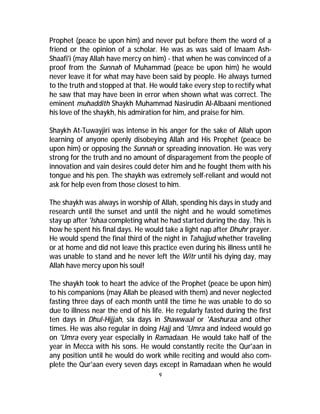
![do so every three days. He would recite nearly four 30ths [Ajzaa’] in his
nightly standing in prayer.
His final illness began during the last three years however he concealed
this up until the last year when it became more intensified. He was hospi-talized
three times and the last time just two days before his death. In his
final illness he was patient and content with that which Allah had decreed
for him until he passed away in the final hour of Tuesday, 5th of Rajab
1413 (December 30, 1992 A.D.). May Allah grant him the widest mercy
and give him the best abode in the Paradise and put him in the company
of the Prophets, the Siddiqeen, the Martyrs, and the Righteous. Aameen.
The prayer for him was made after Salatul-Dhuhr on Wednesday, 6th of
Rajab, 1413 (December 31, 1992 A.D.) in Masjid Ar-Raajihiyy in Riyaadh
and he was buried in the An-Naseem graveyard. His funeral was attended
by masses who filled the masjid and every street and path leading to it
along with many callers, scholars, and notables with Shaykh Abdul-Aziz
Ibn Abdullah Ibn Baaz leading the prayer. The Shaykh was eighty-seven
years, six months and twenty days old at the time of his death. From Allah
we come and to Him do we return.
10](https://image.slidesharecdn.com/entheestablishmentofproof-141015052601-conversion-gate01/85/En-the-establishment_of_proof-10-320.jpg)
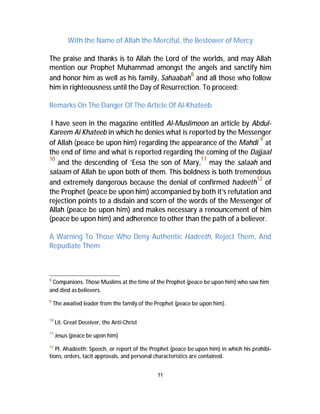
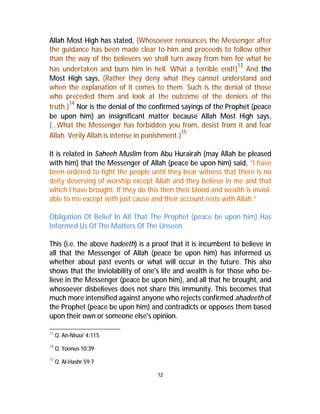
![Stubbornness In Rejecting Authentic Hadeeth
Imaam Ahmed (may Allah Most High have mercy upon him) has said
“Whosoever rejects the hadeeth of the Messenger of Allah (peace be
upon him) is on the brink of destruction” Ishaaq ibn Raahuwayh said:
“Whosoever has received information from the Messenger of Allah
(peace be upon him) confirms its authenticity and then rejects it without
knowledge (i.e. evidence to the contrary) is a disbeliever (kaafir).”
Abu Muhammad Al-Barbahaari stated in his Sharhus-Sunnah “If you hear
a man who discredits the traditions and does not accept them or he de-nies
something of the information from the Messenger of Allah (peace be
upon him), then doubt his Islam for he is a man of the vilest thought and
speech. He is in fact discrediting the Messenger of Allah (peace be upon
him) and his Sahaabah.” He also stated “Anyone of the people of the
qiblah16 is not expelled from the fold of Islam until he has rejected a
verse of the Book of Allah the Mighty and Sublime or has rejected some-thing
from the traditions of the Messenger of Allah (peace be upon him),
or prays to other than Allah or slaughters for other than Allah. If so, it is
your duty to expel him from the fold of Islam.”
He further stated “Whosoever rejects a single verse from Allah's Book has
rejected the Book in its entirety, and whosoever rejects a hadeeth of the
Messenger of Allah (peace be upon him) has certainly rejected the entire-ty
of the traditions and is by that a disbeliever in Allah the Most Great.”
Ibraaheem ibn Ahmed ibn Shaaqilaa has said “Whoever opposes news [of
the Prophet (peace be upon him)] and insolently dares to reject what has
been transmitted by a trustworthy narrator (adl) who has transmitted
directly from someone who is also adl - with no break in the chain of nar-ration
and no criticism of transmitters (narrators) has forced his way into
13
the rejection of Islam”.
16 Direction in which the Muslims pray toward the Ka'ba in Mecca.](https://image.slidesharecdn.com/entheestablishmentofproof-141015052601-conversion-gate01/85/En-the-establishment_of_proof-13-320.jpg)
![Ibn Hazm stated in Kitaabul Ahkaam “When there comes the text (of a
hadeeth) and no two Muslims differ on its correctness and authenticity as
having come from the Messenger of Allah (peace be upon him) and being
what he has in fact said, then it is obligatory to follow it. It (i.e. the Sun-nah)
is the explanation of what Allah intends in the Qur'aan and clarifica-tion
of what has been mentioned without details.”
More Than One Hundred Ninety Good And Authentic17 Ahadeeth Are
Related Regarding The Coming Out Of The Dajjaal
If it is known what is mentioned in [Qur'aanic] verses, the ahadeeth, and
the words of the scholars regarding harshness against those who reject
confirmed hadeeth of the Prophet (peace be upon him), then one will
also know of the confirmation of ten hadeeth concerning the appearance
of the Mahdi at the end of time. I have already cited these ahadeeth as
well as the words of the scholars regarding their authenticity at the be-ginning
of the book Al-lhtijaaj bil Athar 'ala man ankara Al-Mahdi Al-
Muntathar [The argument from the traditions against those who deny the
awaited Mahdi] and you may refer to it.
As far as the appearance of the Dajjaal, it is referred to in one hundred
ninety good and authentic ahadeeth. I have cited them in volume 2 of
Ithaaf Al-Jama'ah Bimaa Ja’a Fil-Fitan wal-Malaahim wa Ashraatis-Saa’ah
you may refer to it.
The Ahadeeth Regarding The Coming Of The Dajjaal Are Supported
From Numerous Positions
Even if there was no such (body of evidence), the order to seek refuge
from the trial of the Dajjaal in every salaah18 would be sufficient as a
confirmation of his appearance and is a refutation against those who
would deny it.
14
17 Hasan & Saheeh
18 Al-Bukhaari Kitaab Sifatus-Salaat, Vol. 1 No. 745, p. 441-442 & Muslim Kitaab As-Salaah,
Vol.1 p.291, 1216 - 1225.](https://image.slidesharecdn.com/entheestablishmentofproof-141015052601-conversion-gate01/85/En-the-establishment_of_proof-14-320.jpg)
![What Is Reported Regarding The People Who Deny Stoning, The Coming
Out Of The Dajjaal, The Pool Of Muhammad (peace be upon him), Pu-nishment
In The Grave, And Those Who Would Be Extracted From The
15
Hellfire
Abdur-Razaaq narrates with a hasan chain that Ibn Abbaas (may Allah be
pleased with him) said “I heard Umar ibn Al-Khattaab (may Allah be
pleased with him) saying: ‘There shall come after you a people who will
disbelieve in stoning,19 disbelieve in the Dajjaal, disbelieve in the Haud20,
disbelieve in the punishment of the grave, and disbelieve in a people be-ing
pulled out of the fire.’ This narration from him is marfou’ 21 because
there is within it news of the unseen. It however has not been said from
['Umar's] opinion. Indeed, it is said from having a previous basis [from the
Prophet (peace be upon him)].
AMention Of Those Sects Who Deny The Coming Of The Dajjaal
There has appeared corroboration in this denial of the Dajjaal and other-wise.
Many sects have completely denied the appearance of the Dajjaal
such as the Khawaarij,22 the Jahmiyyah,23 and some of the Mu'tazilah.24
19 i.e. carrying out the capital punishment of adulterers by stoning to death.
20 The Pool of the Messenger of Allah (peace be upon him) from which only the believers
shall drink on the Day of Resurrection before entering Al-Jannah.
21 Attributable to the Prophet (peace be upon him).
22 Lit. dissenters. An early sect given to extremes who first aligned themselves with the
Caliph Ali ibn Abi Taalib (may Allah be pleased with him) but later called even him a disbe-liever
for having accepted arbitration with Mu'aawiyyah ibn Abi Sufyaan (may Allah be
pleased with him). They believed that commission of major sins made one a kaafir doomed
to eternal Hellfire.
23 An early sect one of whose principles was to deny the attributes of Allah and that Eemaan
was merely cognition and one's faith was like that of the prophets regardless of one's ac-tions.](https://image.slidesharecdn.com/entheestablishmentofproof-141015052601-conversion-gate01/85/En-the-establishment_of_proof-15-320.jpg)
![They reject the ahadeeth related on the matter. This is mentioned by Ibn
Katheer in An- Nihaayah where he says “They have left the realm of the
scholars by their rejection of what is widely reported in authentic reports
from the Messenger of Allah (peace be upon him).”
The Way Of The People Of The Sunnah And All The Muhaddithoon, Jur-ists
And Thinkers Is To Confirm The Coming Out Of The Dajjaal
An-Nawawi relates in his commentary on Saheeh Muslim that Ahlus-
Sunnah25, all the muhaddithoon26, jurists, and thinkers all authenticate
the appearance of the Dajjaal opposing those who deny it from the Kha-waarij
and the Jahmiyyah and some of the Mu'tazilah.”
Some Modernists Deny The Coming Of The Dajjaal And Many Portents
Of The Hour
The Khawaarij, the Jahmiyyah and the Mu'tazilah have been succeeded in
the denial of the appearance of the Dajjaal by many of the pseudo-scholars
(so-called academicians) of our time27 and times past. Addition-ally,
many of them also deny most of the signs of the Hour that have also
been confirmed as from the Prophet (peace be upon him). Many of them
interpret [hadeeth] in a manner that is in accordance with their twisted
24 A sect known also as the Rationalists who denied all of Allah's attributes and who put
man's rationale before the revelation as a source of law and arrival at the Truth of Allah's
Tawheed (singularity). They held that a sinner was neither a believer (mu'min) or disbeliever
(kaafir) but something in between and major sins without repentance would be the cause of
one being consigned to eternal Hell.
25 Lit. People of the Sunnah. Meaning they adhere to the Sunnah of Muhammad (peace be
upon him) and regard it as a source of law along with the Qur’aan and they adhere to the
methodology and beliefs of the first Muslims and agree upon these principles as the basis of
the religion.
26 Scholars in the science of hadeeth verification.
27 i.e. Dr. Kaukab Siddique in his book The Dajjaal: Superpower U.S.A., 1991
16](https://image.slidesharecdn.com/entheestablishmentofproof-141015052601-conversion-gate01/85/En-the-establishment_of_proof-16-320.jpg)
![and corrupt thinking. Some of their words are cited in Itthaaf Al- Ja-maa'ah,
to which you may refer. If those whom we have pointed to were
truly people of knowledge they would never have rejected a single thing
from the authenticated ahadeeth of the Prophet (peace be upon him)
and they would have in fact received them with pleasure, full acceptance,
and unquestioning recognition.
The Ahadeeth Have Been Reported Through A Large Number Of Chains
Of Narrators (Tawaatur) On The Descent Of 'Eesa At The End Of Time
As far as the descent of 'Eesa the son of Maryam (peace be upon him) at
the end of time is concerned, it occurs in Qur'aanic verses. In widely re-ported
hadeeth28 of the Prophet (peace be upon him) comes the news of
his (peace be upon him) descent such as reports that he ('Eesa) shall slay
the Dajjaal, and he will be an upright judge among the Muslims and a
righteous Imaam. This is reported in many statements of the Sahaabah
and the following generation, and some of them mention agreement of
the Sahaabah (may Allah be pleased with them on his descent. None of
the scholars of shari’ah29 differed on this matter. On the contrary, it is
denied only by heretical philosophers whose dissent is not even consi-dered
as legitimate. All this again is cited enough in Ithaaf Al-Jama'ah.
The Descent Of 'Eesa (peace be upon him) Is A Reality Confirmed In The
Qur'aan
As for what comes under the first heading [i.e. of Al-Khateeb's article]: Is
what is related on the descent of 'Eesa (peace be upon him) at the end of
time an actuality that is confirmed by the Qur'aan or is it a matter that is
in fact incompatible with Islam?
28 Tawaatur Ahadeeth - Ahadeeth reported by such a large number of narrators from the
time of the Prophet (peace be upon him) and through each era (up to the period in which
these hadeeths were collected into books by the scholars such as Ahmed, Al-Bukhaari,
Muslim, etc.) that there is no possibility of them being unauthentic.
17
29 Islamic Law](https://image.slidesharecdn.com/entheestablishmentofproof-141015052601-conversion-gate01/85/En-the-establishment_of_proof-17-320.jpg)
![The answer: On the contrary, the descent of 'Eesa ibn Maryam (peace be
upon him) at the end of time is an actuality confirmed by the Qur'aan
itself. Allah Most High says in characterizing His Messenger (Muhammad
peace be upon him). "He does not speak from his whim; Verily it is [his
speech] nothing but an inspired revelation.”30 It is also widely reported
that the Prophet (peace be upon him) spoke of the coming of 'Eesa
(peace be upon him) at the end of time and it is therefore incumbent to
believe in it according to the words of Allah Most High. “And what the
Messenger brings you take it.”31
Proof From The Qur'aan On The Descent Of 'Eesa (peace be upon him)
There are two verses of the Qur'aan on this matter. One in which Allah
Most High says “There is none of the People of the Book except who must
believe in him before his death.”32 On this Ibn Abbaas (may Allah be
pleased with him) has said: “Before the death of 'Eesa ibn Maryam (peace
be upon him).” As related by Ibn Jareer with an authentic chain.
Al Haakim related in Al-Mustadrak from Ibn Abbaas (may Allah be pleased
with him) regarding this verse that he said, “The appearance of 'Eesa ibn
Maryam.” Al-Haakim has said this report is authentic according to the
criterion of the two shaykhs (Al-Bukhaari and Muslim) and supported by
Adh-Dhahabi in At-Talkhees.
Abu Bakr Al-Aajurri relates in his book Ash-Sharee'ah from Ibn Abbaas on
this verse as having said: “It means that a group from the People of the
Book will recognize ‘Eesa upon his appearance and by that believe in
him.” Ibn Mardawiyyah reports that Abu Hurairah (may Allah be pleased
with him) has made statements similar to that of Ibn Abbaas about this
verse and this statement is the correct explanation of the verse. It was
considered so by Ibn Jareer (At-Tabaree) as well as Ibn Katheer. It is also
18
30 Q. An-Najm 55:4
31Q. Al-Hashr 59:7
32 Q. An-Nisaa 4:159](https://image.slidesharecdn.com/entheestablishmentofproof-141015052601-conversion-gate01/85/En-the-establishment_of_proof-18-320.jpg)
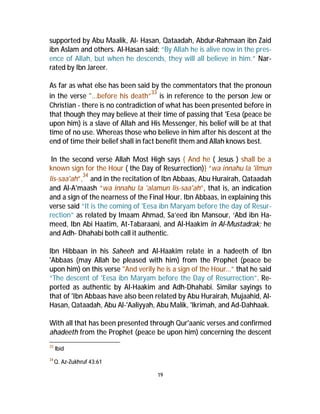
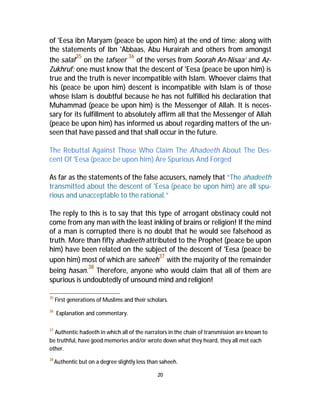
![Rebuttal Against Those Who Claim The Descent Of 'Eesa (peace be upon
him) Defies Reason And Logic
Regarding the false statement that: “The descent of 'Eesa cannot be ac-cepted
by logic.”, the reply is thus: In so far as sound logic and the unim-paired
mind that inclines toward the truth wherever it turns, it will not
abstain from the acceptance of what comes from the Book of Allah Most
High or from what is widely reported (mutawaatir) from the Messenger
of Allah (peace be upon him) about the descent of 'Eesa at the end of
time. Whereas deviant logic, and the corrupted mind; However of no
consequence is such deviant logic and its people [who espouse or accept
it].
Rebuttal Against Those Who Say The Descent Of 'Eesa (peace be upon
him) Is Impossible
Regarding the statement that “'Eesa's return is impossible because Mu-hammad
is the last of the Prophets according to Qur'aanic text.”
The answer is: When 'Eesa (peace be upon him) descends at time's end
he will not come with a new law, nor will he judge according to the In-jeel,
39 rather, he will judge according to the Book of Allah and the sunnah
of Muhammad (peace be upon him). He will be one among this nation of
Muslims as transmitted by Imaam Ahmad, Al-Bukhaari, and Muslim from
Abu Hurairah (may Allah be pleased with him) who said “The Messenger
of Allah (peace be upon him) said, "How will you be when 'Eesa ibn Ma-ryam
descends upon you and there will be an Imaam from amongst you?”
In Muslim's transmission "How will you be when Ibn Maryam descends
upon you and will be your Imaam?” Waleed ibn Muslim said “I said to Ibn
Abi Dhi'b that Al-Awzaa'i told us from Az-Zuhri from Naaf'i from Abu Hu-rairah
“...and there will be an Imaam from amongst you.” Ibn Abi Dhi'b
said “Do you know what ‘...leads from amongst you’ is?” I said “Inform
21
39Revelation to ‘Eesa (peace be upon him)](https://image.slidesharecdn.com/entheestablishmentofproof-141015052601-conversion-gate01/85/En-the-establishment_of_proof-21-320.jpg)
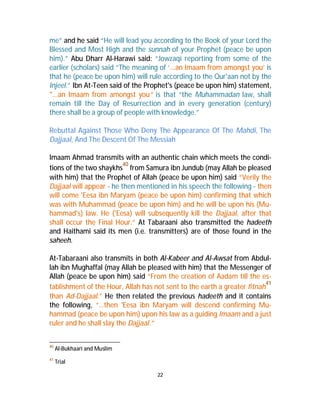
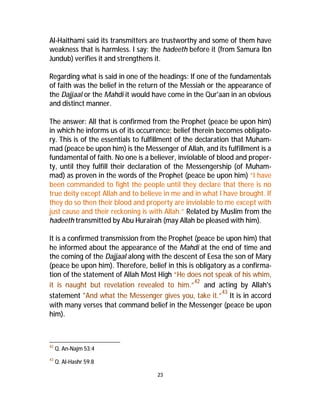
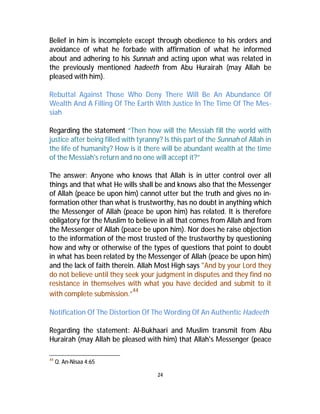
![be upon him) said “By one in whose hand is my soul it will come soon
when the son of Mary (peace be upon him) shall descend amongst you
and he will break the cross, slaughter the pig, and abolish war.”
The response to this is: The writer has distorted the wording of the ha-deeth
where he said “abolish war”. The words of the hadeeth are “abolish
the jizyah”45 and anyone who intentionally distorts the words of the Mes-senger
of Allah (peace be upon him) falls amongst the numbers of liars
upon Allah's Messenger (peace be upon him). In a widely reported ha-deeth
of the Prophet (peace be upon him), he said: “Whoever purposely
lies on me has prepared his seat in the Hellfire.”46
Perhaps the writer did not intend this distortion and may have done so
out of negligence or he may have found this narration in some books that
had not been corrected from misprints.
Rebuttal On Al-Khateeb's Claim That The Ahadeeth On The Descent Of
'Eesa (peace be upon him) And The Coming Out Of The Mahdi And The
Dajjaal Have No Relationship With Belief (Al-‘Aqeedah)
Regarding his statement: “That which has been related from the hadeeth
and reports in the matter of the return of the Messiah (peace be upon
him) or in the matter of the appearance of the Dajjaal or the Mahdi,
there is no connection in them with belief, whether authentic or not.
Islamic belief is built upon faith in Allah, His angels, His prophets, His
books, the Hereafter, the Reckoning and the reward of the Paradise and
the Hellfire.”47
45 Amount of money paid to the Islamic government by Jewish and Christian subjects living
under Muslim rule.
46 Al-Bukhaari, Kitaab Al-Ilm. p. 83-84 Nos. 106 - 108.
47 It should be noted here that Al-Khateeb does not mention belief in Allah's Measure or
Pre-Ordainment and Foreknowledge [Qadar]. This, along with others of his beliefs, is consis-tent
with those of the Qadiani sect who believe in Ghulam Ahmed as a prophet and they
have thereby been categorically condemned as disbelievers by the scholars of Islam.
25](https://image.slidesharecdn.com/entheestablishmentofproof-141015052601-conversion-gate01/85/En-the-establishment_of_proof-25-320.jpg)
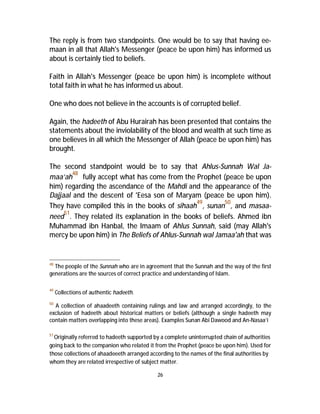
![transmitted by Abdoos ibn Malik Al-'Ataar, "One must have Eemaan52
that the Maseeh Al-Dajjaal will come out and written between his eyes
(will be the word) kaafir (disbeliever) and believe in the ahadeeth that
speak of it. And eemaan (faith) that it shall happen and that 'Eesa ibn
Maryam (peace be upon him) will descend and kill him at the gate of
Lud.”53
What Is Mentioned By Consensus [Of The Sahaabah] On The Descent Of
'Eesa (peace be upon him) And The Words Of The Major Scholars
Abu Muhammad Al-Barbahaari (May Allah have mercy upon him) said in
his Sharhus-Sunnah: "And having Eemaan is that 'Eesa ibn Maryam will
descend and he will kill the Dajjaal and he will marry and pray behind an
Imaam from the family of Muhammad (peace be upon him) and he will
die and be buried by the Muslims.” And the Imaam from the family of
Muhammad (peace be upon him) is the Mahdi as related in the hadeeth
of Jaabir (may Allah be pleased with him) that the Messenger (peace be
upon him) said “‘Eesa ibn Maryam will descend and the leader of the
Muslims will say ‘Lead us in prayer’ and he (‘Eesa) will say ‘No. That one
from them should be the leader of others is an honor which Allah has
given this nation.” Related by Haarith ibn Abi Usaamah in his musnad54
with a good chain of transmission (isnaad jayyid), and Ibn Al-Qayyim has
mentioned it in his book Al-Manaar Al-Muneef and has classified it with
isnaad jayyid. At-Tahaawi (may Allah have mercy upon him) has said in his
famous book on 'aqeedah, “We believe in the signs of the Hour of the
appearance of the Dajjaal and the descent of 'Eesa ibn Maryam (peace be
upon him) from the heavens.”
27
52 Belief
53 Muslim - Vol. 4, Kitaab Al-Fitan wa Ashrat As-Saa'ah, p. 1517, No. 7015
54 Collection of the hadeeth arranged according to the sahaabi who narrated it from the
Prophet (peace be upon him).](https://image.slidesharecdn.com/entheestablishmentofproof-141015052601-conversion-gate01/85/En-the-establishment_of_proof-27-320.jpg)
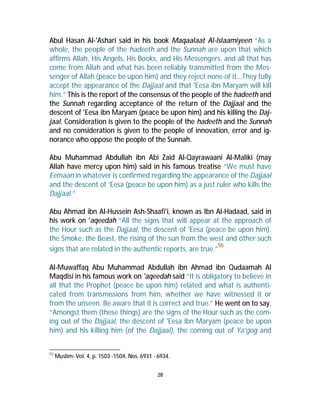
![Ma’gog, the sun rising from the west, the appearance of the Beast, and
other similar events that have authentic transmission.”
Shaykhul-Islam Abul 'Abbaas ibn Taymiyyah (may Allah Most High have
mercy upon him) said on this issue “'Eesa the son of Mary (peace be upon
him) is living - as Allah has raised him unto Himself body and soul. Allah
says 'Innee mutawaffeek'56 meaning 'to seize hold of you' (qabiduka).
Likewise it is confirmed that he will descend at the white minaret in east-ern
Damascus, kill the Dajjaal, break the cross, slaughter the swine, and
abolish the Jizyah as a fair and just ruler. Attawaffi can mean al-isteefaa’
= fulfilling something, it can mean mawt = death, and it can mean nawm
= sleep. Each one of these meanings would be indicated by the way it is
used in the sentence.”
Al-Qaadi 'Iyaad in his explanation of Saheeh Muslim said “The descent of
'Eesa (peace be upon him) and his killing the Dajjaal are true and authen-tic
among Ahlus-Sunnah according to the saheeh hadeeth in the subject.
There is no rationale nor anything in the shari’ah that invalidates it (this
belief). Therefore, it is obligatory to affirm its truth. This is rejected by
some of the Mu'tazilah, the Jahmiyyah and those who agree with them.
They claim that these ahadeeth are rejected by the words of Allah Most
High "He is the seal of the Prophets”57 and the words of the Prophet
(peace be upon him) “There will be no Prophet after me”58 and by the
consensus of the Muslims that there will be no prophet after our Prophet
(peace be upon him) and that his law is everlasting and un-abrogated
until the Day of Resurrection. These are unsound [to cite] as evidence
because it is not intended by the descent of 'Eesa (peace be upon him)
that he will be a prophet with a shari’ah that abrogates our shari’ah and
there is nothing in the ahadeeth to that effect. On the contrary, the ha-deeth
confirms that he ('Eesa) will descend as a just ruler who shall judge
according to our shari’ah and who shall revive the matters of deen that
29
56Q. Aali ‘Imraan 3:155
57 Q. Al-Ahzaab 33:40
58 At-Tirmidhi, in Al-Fitan C. 4:498, 2219, Abu Dawoud 4252, Ahmed 5/278](https://image.slidesharecdn.com/entheestablishmentofproof-141015052601-conversion-gate01/85/En-the-establishment_of_proof-29-320.jpg)
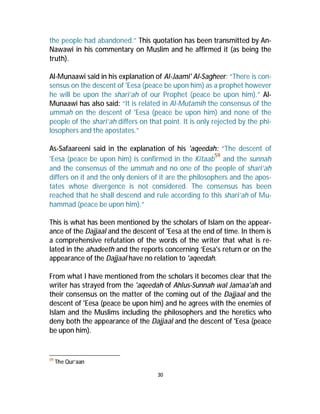
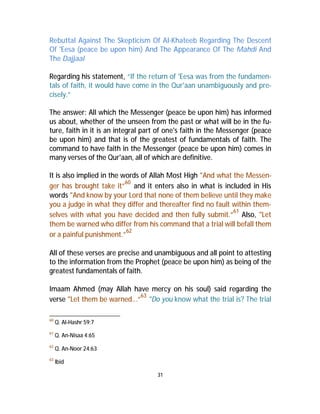
![is shirk64 which - if he rejected some of his words (i.e. Muhammad's) -
may befall him by some deviation settling upon his heart and thereby be
destroyed.” He then began to read the verse "And know by your Lord…”65
Rebuttal Against His Claim That The Reports On The Descent Of 'Eesa
(peace be upon him) And The Appearance Of The Mahdi Open The Door
To Dangerous Trials (Fitna)
As far as his statement, “Reports like these open the doors to trials upon
the people when many souls (i.e. people) seek to claim this; as has hap-pened
to many who claimed themselves to be the awaited Mahdi and
they caused division and bloodshed amongst the Muslims. It is not far-fetched
that one may stand before the people claiming he is the awaited
Messiah and what will you do in that case!?”
The answer: The reports from the Prophet (peace be upon him) that are
confirmed are not rejected due to possibilities and incorrect pretexts. On
the contrary, they are to be affirmed as true and accepted even if the
content causes trial to who would be tried among the people. Allah Most
High said in ordering His Messenger (peace be upon him) to say to the
people: “…I have been ordered to read the Qur’aan and whosoever ac-cepts
guidance does so for his own soul and as far as he who strays say
that I am but of the warners”.66 This is what is to be said concerning con-firmed
reports about the Prophet (peace be upon him) that they are to be
met with full acceptance and affirmation. Whatever comes from the
64 The opposite of Tawheed and it constitutes association in any form of partners, equals, or
superiors to Allah in a) His being the Creator of all that exists, its Sustainer, and Giver of life
and death (Ruboobiyyah) b) His having the right to be worshipped, to be the object of love
due to Him alone, and having the right to be obeyed as the only true deity (Uloohiyyah) c)
His possessing unique characteristics and perfection in names and attributes (Al-Asmaa’
was-Sifaat). The three major types of shirk are: Ash-Shirk al-Akbar [Major shirk]; Ash-Shirk
Al-Asghar [Minor shirk]; Ash-Shirk Al-Khafy [Inconspicuous Shirk].
32
65 Q. An-Nisaa 4:65
66 Q. An-Naml 27:92](https://image.slidesharecdn.com/entheestablishmentofproof-141015052601-conversion-gate01/85/En-the-establishment_of_proof-32-320.jpg)
